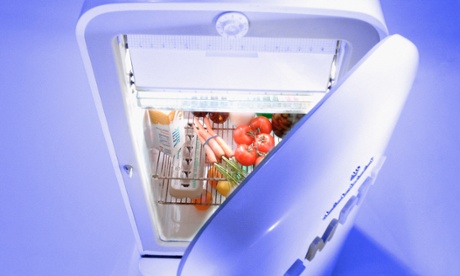
On a hot day, when the milk tastes as though it waited on the doorstep just a little too long, I’m transported back to being a student. At college, a few people did have tiny fridges in their rooms, miniature white goods purchased for them by indulgent parents who couldn’t, it seemed, possibly imagine how their poor darlings would survive without a proper place to keep their perishables. But the rest of us made do with our window ledges, on which we balanced precariously our plastic bottles of semi-skimmed and, in some cases, a tub of Anchor. Returning early in the morning from my latest assignation, the sight of it used to make me smile: 60 pairs of drawn curtains, each set accessorised with its own dairy products. There was something comforting about this outward display of domesticity. In our common desire for tea, coffee and toast were we united – even the mathematicians and the guy who’d been at Eton.
In his new book, Chilled: How Refrigeration Changed the World and Might Do So Again, Tom Jackson has little time for window ledges, Gothic or otherwise. Nor does he devote much attention to such things as pantries and meat-safes, where people kept food before fridges were commonplace (in 1965, only a third of British households owned one). Jackson regards the invention of the refrigerator as one of humanity’s greatest achievements, and thanks to this is less interested in maggoty joints, rancid butter and salted anchovies than he is in telling its story from start to finish. (Its beginning, incidentally, dates back to the 18th century BC, when a Mesopotamian king called Zimri-lim ordered the construction of an elaborate ice house in Terqa on the western bank of the Euphrates). In a way, I suppose, this is fair enough – refrigeration is pretty cool – and I do recommend his book, which is interesting, especially when he gets to the ice wars of 19th-century America, during which one entrepreneur attempted to transport a Labrador iceberg to Martinique in a whaler (not a massive success, as these things go). But still, I can’t help but feel that by failing to note that until quite recently we managed to get along without fridges, he is only giving us half the story.
As I may have mentioned before, I feel bad about my fridge, and not only because its ice box needs defrosting so very badly (as I write, its sole occupant is a single Magnum ice cream; it lies there in some state, like Tutankhamun in his tomb). I can trace far too many bad habits back to the lure of its humming spaces, not least my shameful tendency to buy more fruit and vegetables than we can ever use in a single week (the certain knowledge that the stuff in my fridge won’t keep forever seems to be in permanent conflict with my feeling that its shelves are unhelpfully bare). My view of bagged salads are, for instance, that they’re a poxy rip-off and to be avoided at all costs – and yet, there is always one day in the month when, pathetically, I give in and buy one. Or take cheese and tomatoes. Again and again, I tell myself it’s stupid to put either in the fridge: what passes for our cellar will do for the cheese, and the tomatoes should be allowed to bask in a bowl by the window. But then my confidence will wobble – I blame the stupid “hygiene” lessons we had at school – and they’re promptly dispatched to the fridge, the better to lose, overnight, every last bit of their flavour.
My fridge, as you’ll have gathered by now, is a temperature-controlled graveyard, a place where double cream, broccoli and feta go to die. For a puritan like me, this is anxiety-inducing; I’ve only to be in the same room as it to feel guilty. And here’s another thing I’ve learned: this is not about to get better any time soon. Even if I do manage to introduce a successful programme of reform, my appliance will still get me in the end. According to Jackson, fridges will one day be so smart that when their contents begin to run low, they’ll simply get in touch with the supermarket and replenish them. In other words, we’re looking at a future in which – here’s another habit I must tackle before it’s too late – hiding your illicit supplies of, say, Cadbury’s Mini Rolls in your crisp box could have serious consequences. You bought them in a moment of weakness, one the machine is never going to let you forget.

